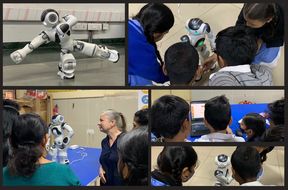Envisioning sustainable 6G smart schools with children, by children

Through hands-on workshops employing design futuring and other qualitative approaches, the 6G Smart School project explores the concepts of sustainable schools designed with children, by children. It examines new forms of pedagogy and participatory engagement with emerging technologies, such as AI and robots, that promote critical, playful, and inclusive digital citizenship among young learners. In addition, it investigates the sustainable design of smart schools with smart sensors, the internet of things (IoT), artificial intelligence (AI), and robots for rural areas.
The project is a transnational collaboration between researchers at the University of Oulu, Tampere University, Aalto University, Microsoft Research India, IIT Bombay, IIT Kanpur, and IIIT Delhi. The project is implemented by Associate Professor Marianne Kinnula (PI), Professor Netta Iivari, and postdoctoral researcher Sumita Sharma in INTERACT Research Unit, Faculty of Information Technology and Electrical Engineering as part of the 6G Flagship. The 6G flagship is focused on creating future know-how and sustainable solutions for society’s needs in the 2030s.
The research team collaborates with stakeholders such as schoolchildren, teachers, school administration, and community members. As part of the project, INTERACT Research Unit conducted hands-on workshops with 7th graders in a public school in New Delhi in November 2022, where participants interacted with the Nao v6 robot and learned how to program it using block programming (see images above), and designed future scenarios with robots in their everyday lives, imagining what robots can and cannot do in the future. More such workshops are planned for the upcoming years.
The expected outcomes of the project will provide recommendations for best practices, novel curricula, and scaled-up programs, envisioning what 6G can bring to the sustainable smart schools of the 21st century. The primary demographic for impact is young learners along with educators and institutional administrators, to influence the overall ecology of learning and civic engagement in their communities. More information about the project is available here.
Envisioning Sustainable 6G Smart Schools with Children, by Children is seed-funded as part of the India Pilot initiative from the Finnish Ministry of Education and Culture. Aalto is coordinating the India Pilot Network FICORE (Finnish Indian Consortia for Research and Education) which involves 38 higher education institutions from Finland and India.
